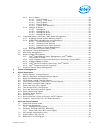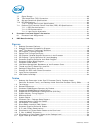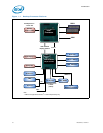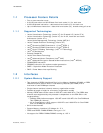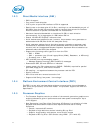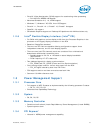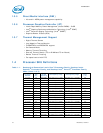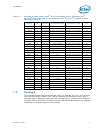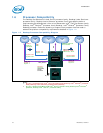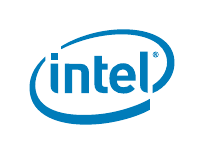
Datasheet, Volume 1 13
Introduction
to transmit data across this interface. This also does not account for packet
overhead and link maintenance.
• Maximum theoretical bandwidth on the interface of 8 GB/s in each direction
simultaneously, for an aggregate of 16 GB/s when x16 Gen 2
• Gen 3 raw bit-rate on the data pins of 8.0 GT/s, resulting in a real bandwidth per
pair of 984 MB/s using 128b/130b encoding to transmit data across this interface.
This also does not account for packet overhead and link maintenance.
• Maximum theoretical bandwidth on the interface of 16 GB/s in each direction
simultaneously, for an aggregate of 32 GB/s when x16 Gen 3
• Hierarchical PCI-compliant configuration mechanism for downstream devices
• Traditional PCI style traffic (asynchronous snooped, PCI ordering)
• PCI Express* extended configuration space. The first 256 bytes of configuration
space aliases directly to the PCI Compatibility configuration space. The remaining
portion of the fixed 4-KB block of memory-mapped space above that (starting at
100h) is known as extended configuration space.
• PCI Express* Enhanced Access Mechanism. Accessing the device configuration
space in a flat memory mapped fashion.
• Automatic discovery, negotiation, and training of link out of reset
• Traditional AGP style traffic (asynchronous non-snooped, PCI-X Relaxed ordering)
• Peer segment destination posted write traffic (no peer-to-peer read traffic) in
Virtual Channel 0:
— DMI -> PCI Express* Port 0
• 64-bit downstream address format; however, the processor never generates an
address above 64 GB (Bits 63:36 will always be zeros)
• 64-bit upstream address format; however, the processor responds to upstream
read transactions to addresses above 64 GB (addresses where any of Bits 63:36
are nonzero) with an Unsupported Request response. Upstream write transactions
to addresses above 64
GB will be dropped.
• Re-issues Configuration cycles that have been previously completed with the
Configuration Retry status
• PCI Express* reference clock is 100-MHz differential clock
• Power Management Event (PME) functions
• Dynamic width capability
• Message Signaled Interrupt (MSI and MSI-X) messages
• Polarity inversion
Note: The processor does not support PCI Express* Hot-Plug.



